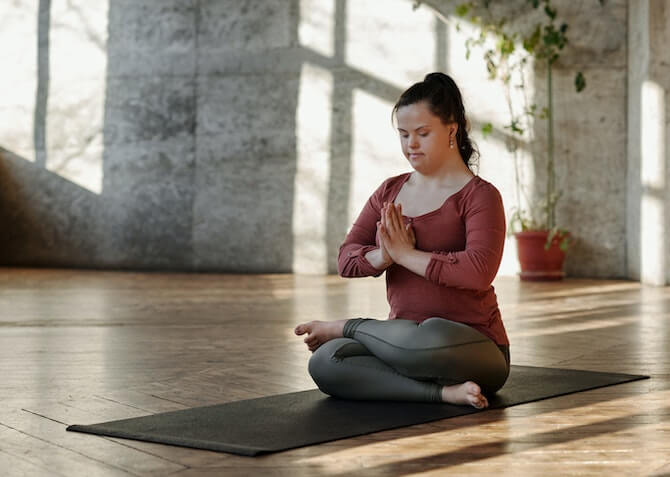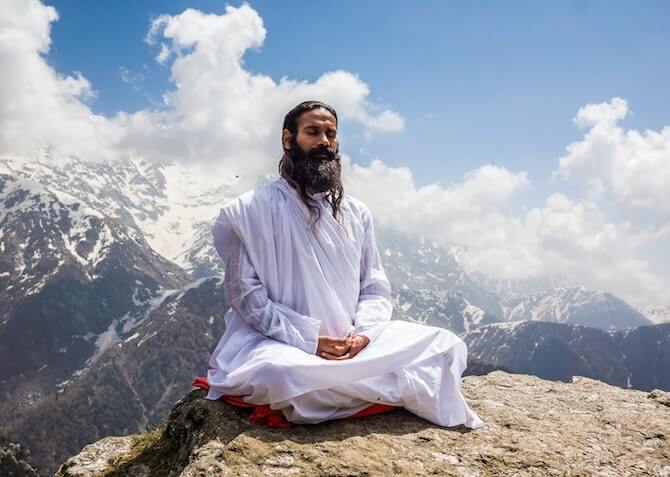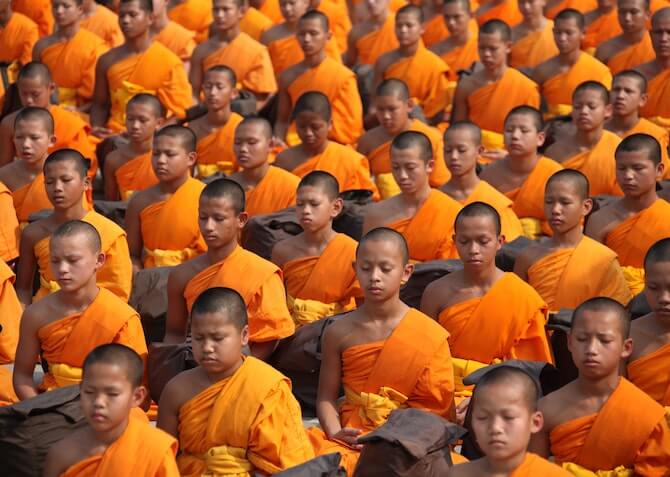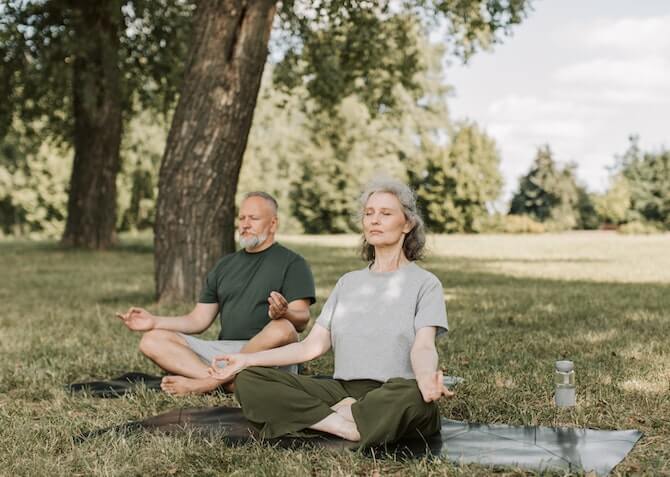
Meditation and Sleep: A Connection Explained
The fascinating connection between sleep and meditation is a topic that has intrigued many curious minds, and rightfully so!
Both sleep and meditation can play significant roles in our overall well-being and mental health.
Meditation and Sleep
First things first; let's talk about sleep.
We all know how essential it is for our bodies and minds to recharge and rejuvenate. During sleep, our brains consolidate memories, repair tissues, and regulate various physiological processes. It's like hitting the reset button every night, preparing us for the challenges of the next day.
Now, meditation, on the other hand, is a practice that has been around for centuries, championed by ancient traditions like Buddhism and Hinduism.
It involves calming the mind and focusing inward, often through techniques like mindfulness, breathing exercises, or mantra repetition. The primary goal of meditation is to achieve a state of mental clarity and heightened awareness.
"How do these two seemingly different things connect?"
Well, here's the exciting part: meditation can actually complement and improve the quality of our sleep.
For starters, both sleep and meditation are crucial for stress reduction. When stress affects us, our bodies release cortisol, a hormone that can disrupt our sleep patterns.
Regular meditation helps lower cortisol levels, promoting a more relaxed state both during the day and at bedtime.
Moreover, practicing meditation before bedtime can serve as an excellent sleep preparation ritual. As you engage in meditation, your mind becomes less cluttered with racing thoughts, worries, and anxieties.
This mental decluttering can pave the way for a smoother transition into a peaceful slumber.

One of the most significant benefits of meditation is its impact on the quality of sleep.
When you meditate regularly, you may notice improvements in the duration of your sleep cycles and a reduction in sleep disturbances. This means you're more likely to enjoy deep, restorative sleep, leaving you feeling refreshed and energized the next morning.
Now, let's flip the coin and talk about how sleep influences meditation. Think about it: when you're well-rested, your mind is clearer, more focused, and more receptive to the benefits of meditation.
It's like sharpening the tools you need to embark on a successful meditation journey.
During deep sleep stages, your brain consolidates memories and processes information, including what you've learned during meditation sessions.
So, a good night's sleep can enhance your meditation practice by allowing your mind to retain and integrate the insights gained during those serene moments.
Not only that, but sleep also plays a crucial role in regulating your emotional state. Lack of sleep can lead to increased irritability, mood swings, and difficulty concentrating.
On the other hand, when you're well-rested, you're better equipped to engage in meditation with a calmer and more positive outlook.
In a way, sleep and meditation create a positive feedback loop. The more you meditate, the better your sleep, and the better your sleep, the more beneficial your meditation practice becomes.
It's a beautiful cycle of self-care and self-awareness that can significantly enhance your overall quality of life.
History of Meditation
Alright, let's embark on a journey to explore the fascinating history of meditation!
Meditation is an ancient practice that has been woven into the tapestry of human existence for thousands of years. It's a method of calming the mind, finding inner peace, and connecting with something deeper within ourselves.
So, let's take a step back in time and see how this profound practice has evolved throughout history.
India
Our first stop on this historical voyage takes us to ancient India, where the roots of meditation were firmly planted.
It was around 1500 BCE when the Vedas, ancient Indian scriptures, first mentioned meditation as a spiritual practice.
The early meditators sought to understand the nature of reality and connect with the divine through various techniques of deep contemplation and focused breathing.

Fast forward a bit to around 500 BCE, and we find ourselves in the presence of the historical Buddha, Siddhartha Gautama.
He played a pivotal role in spreading meditation beyond the confines of religious rituals. The Buddha taught mindfulness and concentration techniques as a means to attain enlightenment and escape the cycle of suffering and rebirth.
This marked a significant turning point, as meditation started to take on a more secular and accessible nature.
China
Jumping ahead again, we arrive at ancient China, around 500 CE, where Taoist practitioners were embracing meditation as a path to harmony and balance.
They cultivated the art of "Zuowang," which involved letting go of the ego and merging with the Tao, the fundamental force that governs the universe.
This laid the groundwork for later forms of Chinese meditation, such as Chan (Zen) and Daoist meditation.
Egypt
Now, let's leap across continents to the cradle of civilization, ancient Egypt.
Meditation here had a strong religious significance, and it was intricately woven into their spiritual practices.
Egyptian priests and sages engaged in meditative rituals to connect with the gods, gain wisdom, and navigate the mysteries of life and death.
As the centuries passed, meditation continued to spread across cultures and religions. In the 5th and 6th centuries, we encounter the rise of Christian mysticism in the form of contemplative practices.
Early Christian monks sought inner illumination and communion with God through silent reflection and prayerful meditation.
Japan
Skipping forward once more, we find ourselves in medieval Japan, where Zen Buddhism took center stage. Zen meditation, known as Zazen, emphasized the power of sitting and observing the mind without judgment.
This minimalist approach resonated with many, and Zen became a prominent form of meditation that still influences practitioners today.
As the world entered the modern era, meditation began to pique the interest of scholars and philosophers in the West.
In the late 19th and early 20th centuries, figures like Swami Vivekananda and Paramahansa Yogananda introduced meditation to the Western audience, bringing the ancient practice to a global stage.

Western World
Fast forward to the 1960s and '70s, and meditation experienced a boom in popularity in the Western world.
With figures like Maharishi Mahesh Yogi and his Transcendental Meditation, the world saw a surge of interest in various forms of meditation as tools for stress reduction and personal growth.
Today, meditation has become a mainstream phenomenon, with countless techniques and approaches available to people from all walks of life. Scientific research has also caught up, validating the benefits of meditation for physical and mental well-being.
Meditation Popularity
It's been incredible to witness how the popularity of meditation has skyrocketed in recent years.
From stressed-out executives to curious college students, more and more people are turning to this age-old technique to find inner peace and balance in our fast-paced lives.
So, why has meditation become such a trend? Well, there are several reasons for its widespread appeal.

Meditation and Science
First and foremost, meditation offers a refuge from the chaos of everyday life.
In our hyper-connected world, we're bombarded with information, notifications, and never-ending to-do lists. It's no wonder we feel overwhelmed and mentally exhausted.
Meditation provides a sanctuary of stillness and a chance to hit the pause button on our racing minds.
Another factor contributing to the popularity of meditation is the scientific backing it has received. In recent years, researchers have been delving into the effects of meditation on the brain and body.
The results have been astounding.
Studies show that regular meditation practice can reduce stress, anxiety, and depression while enhancing focus, memory, and overall well-being. As the scientific evidence continues to pile up, more people are willing to give meditation a try.
Meditation and Technology
Social media has also played a significant role in popularizing meditation.
Celebrities, athletes, and influencers have openly shared their meditation journeys, creating a ripple effect of curiosity among their followers.
When you see your favourite actor or musician raving about how meditation has transformed their life, it piques your interest. Suddenly, meditation is no longer just a mystical practice reserved for monks in remote temples; it's accessible to everyone, everywhere.
The rise of meditation apps has also made a significant impact. In this digital age, where smartphones are practically glued to our hands, it makes sense that meditation would go mobile too.
These apps provide a range of guided meditations, making it easy for beginners to get started and for experienced practitioners to explore new techniques. With just a few taps, you can transport yourself to a serene, virtual oasis.
Meditation and Well-being
The growing awareness of mental health and self-care has pushed meditation into the spotlight. We're finally acknowledging the importance of looking after our minds as much as our bodies.
Meditation aligns perfectly with this shift in perspective, offering a simple and effective way to nurture our mental well-being. It's like a mental gym, where you can exercise and strengthen your mind.
The COVID-19 pandemic has played a paradoxical role in the popularity of meditation. On one hand, the pandemic brought about increased stress and uncertainty, driving more people to seek coping mechanisms like meditation.
On the other hand, the pandemic also forced us to slow down and re-evaluate our priorities. Many discovered the value of embracing stillness and inner peace during those challenging times.
The diverse forms of meditation available have also contributed to its widespread adoption. From mindfulness meditation to loving-kindness meditation, there's a style to suit every everyone's preferences and needs.
This versatility allows people to find the practice that resonates most with them, enhancing the chances of long-term commitment.
Meditation provides a peaceful escape from a busy life, is scientifically proven, and trustworthy public figures have advocated it's benefits.
Moreover, it aligns with the growing emphasis on mental health and self-care, has been adapted to the digital age through apps, and even found resonance during the pandemic.
Maybe now is a good time to try meditation? Take a look at our infographic showing the basics - it's a great starting point! You might just find yourself on a journey of self-discovery and well-being like never before.








Leave a Reply